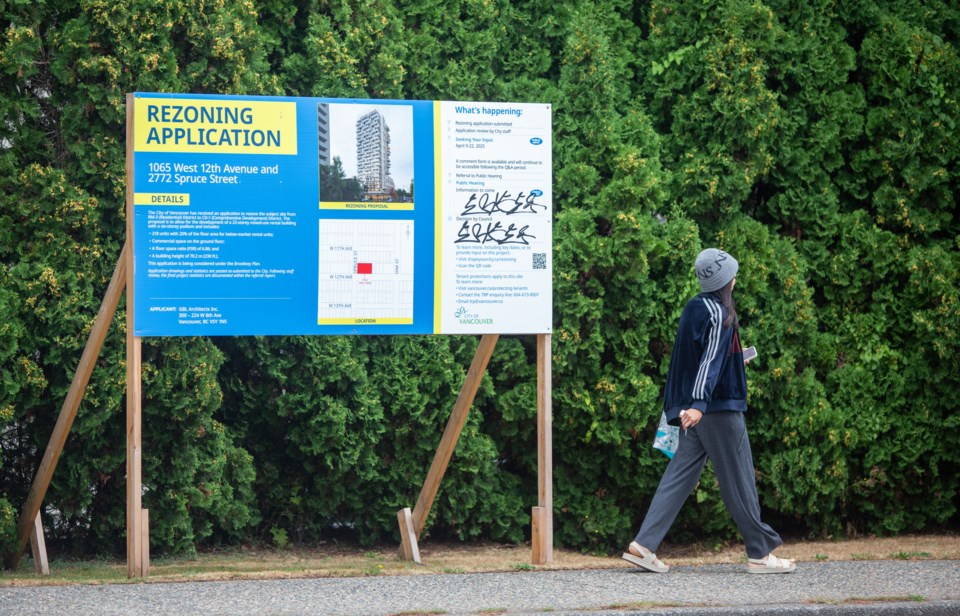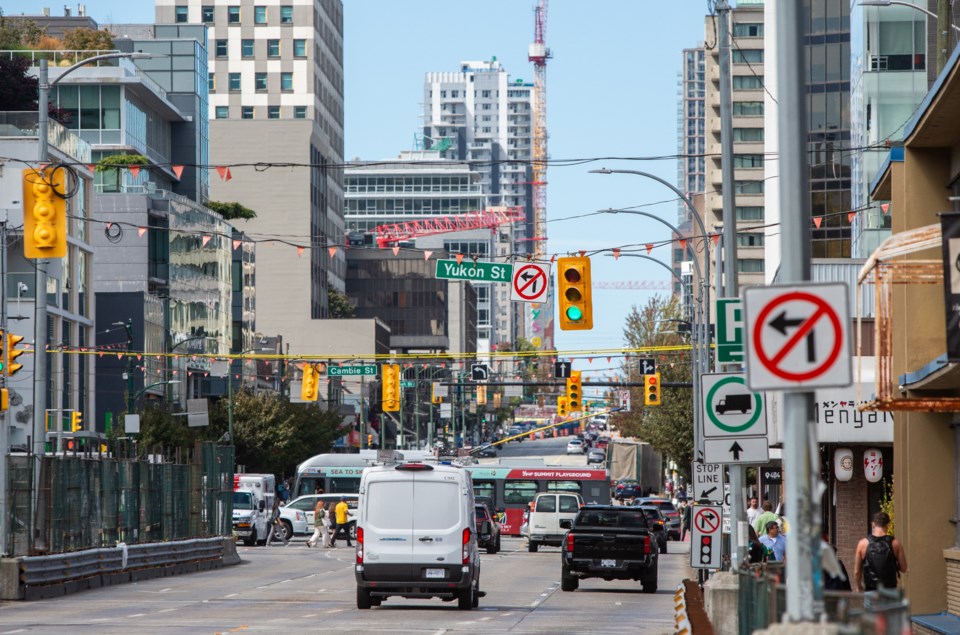New data released by the City of Vancouver shows there are currently 3,835 below-market rental housing units planned for the Broadway plan area, which covers roughly 500 blocks within Vine Street to Clark Drive, and First Avenue to 16th Avenue.
A July 30 memo to council from Josh White, the city’s general manager of planning, said the 3,835 units is about 1.6 times greater than the existing 2,277 rental units that would be impacted by redevelopment in the plan area.
The 3,835 represents projects in what city staff describes as the “development pipeline,” which means developers could be anywhere from being at the enquiry stage to opening a building to tenants.
Overall, there are currently 121 residential projects planned for the Broadway plan area.
“Collectively, these projects comprise 23,857 residential units, of which approximately 88 per cent are secured rental, reflecting alignment with the plan's housing goals,” said White’s memo, which was recently posted to the city’s website.
The 23,857 units breaks down this way:
• 17,183 for market rental.
• 3,833 below-market rental.
• 2,322 strata homeownership units.
• 514 social housing units.
When the 23,857 units will all be tenanted is unclear, with data showing only four building permits and two occupancy permits being issued since the council led by then-mayor Kennedy Stewart approved the plan in September 2022.
These include 44 below-market rental units.

Tenant protections
At the time of the plan’s approval, the aim was to add 30,000 new homes over the next 30 years, but timelines were not set.
The plan’s stated goal is to prioritize market and below-market rental housing, and social housing near transit hubs and corridors to improve access to jobs, schools and community amenities for renters earning low and moderate incomes.
More broadly, that includes transforming low-density neighbourhoods to increase supply, affordability and variety of housing options. Addressing speculation, supporting equity and protecting existing affordable housing for the future are other tenets of the plan.
Increasing supports and protections for renters and people who are homeless was a major focus of the council debate leading up to approval of the plan.
White’s memo indicates there are 1,473 existing rental units on 52 rezoning and development permit application sites for which staff has Broadway Plan Tenant Relocation and Protection Policy (TRPP) data.
That data says 86 per cent of renters have been assessed as eligible under the TRPP, which was the same percentage in a memo White sent to council May 5. For the affected tenants, that could mean compensation, right of first refusal to return to the new building and moving expenses.
Hotel rooms
Meanwhile, staff continue to process applications with the Broadway plan for non-residential projects (30) and mixed-use residential projects (73) with a “non-residential component.”
Eight of those projects include hotels, comprising a total of approximately 1,800 hotel rooms.
A staff report to council in April indicated there was an urgent need to increase hotel supply in Vancouver.
“Occupancy rates are very high and both developers and operators have expressed strong interest in increasing the quantity and variety of hotel options in the city,” said the report, noting there are approximately 13,000 hotel rooms spread across 78 hotels in Vancouver.
“While new hotels did open over the course of the COVID-19 pandemic between 2020 and 2022, there was a net decrease in hotel room supply of about 550 rooms, largely due to senior government-funded conversions of older hotel stock to housing for persons experiencing homelessness.”
With the resurgence of the tourism industry and the growing need for hotel rooms, there is renewed interest in the development of new hotels, added the report, pointing out that approximately 4,200 rooms across 22 projects were in the development pipeline.
In 2022, Destination Vancouver commissioned a specialized study on hotel supply, demand and economic impacts.
The study found that to close the gap between current supply and projected demand, approximately 20,000 new hotel rooms are needed in Metro Vancouver by 2050. Vancouver’s share of this total would be approximately 10,000 rooms.
X/@Howellings




